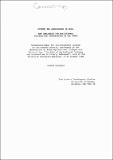Poverty and agriculture in Asia: new challenges for agricultural colleges and universities in the 1990s
Abstract
Although there have been gains in wellbeing and in national food
security in countries of Asia, concern with the poorest 20 to 50 per
cent of the population often points to totally unacceptable
deprivation. Partly in consequence, priorities in agriculture have
shifted from how much is produced towards who produces and where
production takes place. This directs attention to sustainable and
secure livelihoods for resource-poor farmers. It also points to the
relatively complex, diverse and risky agriculture outside the green
revolution areas.
The "transfer-of-technology" (TOT) paradigm which has served
industrial and green revolution agriculture does not fit well with
this third, CDR (complex, diverse, risky) agriculture. The
complementary "farmer-first" (FF) paradigm implies farmer
participation in research, and a quiet professional revolution, with
reversals of location and role. Scientists and extensionists learn
from, support and advise farmers, whose own analysis, choice and
experiments are prominent. FF approaches hold promise of serving many
millions of the poorest.
The challenge to Agricultural Colleges and Universities is to take
and maintain the lead in developing and disseminating FF approaches
and methods. This raises hard questions of professional rewards, of
scope for young professionals, and of syllabi and textbooks. For
national agricultural systems it raises questions of management
information systems to serve farmers! needs and demands, of
decentralisation of resources and discretion, and of the roles and
relationships of research and extension. Paradigm shifts are painful
and resisted by normal professionals; but here the new paradigm is
complementary, not alternative. Those Colleges and Universities, and
those professionals, who take the lead in the 1990s may be seen in
the 21st century as pioneers in the greatest enterprise of the human
race, the elimination of poverty.

